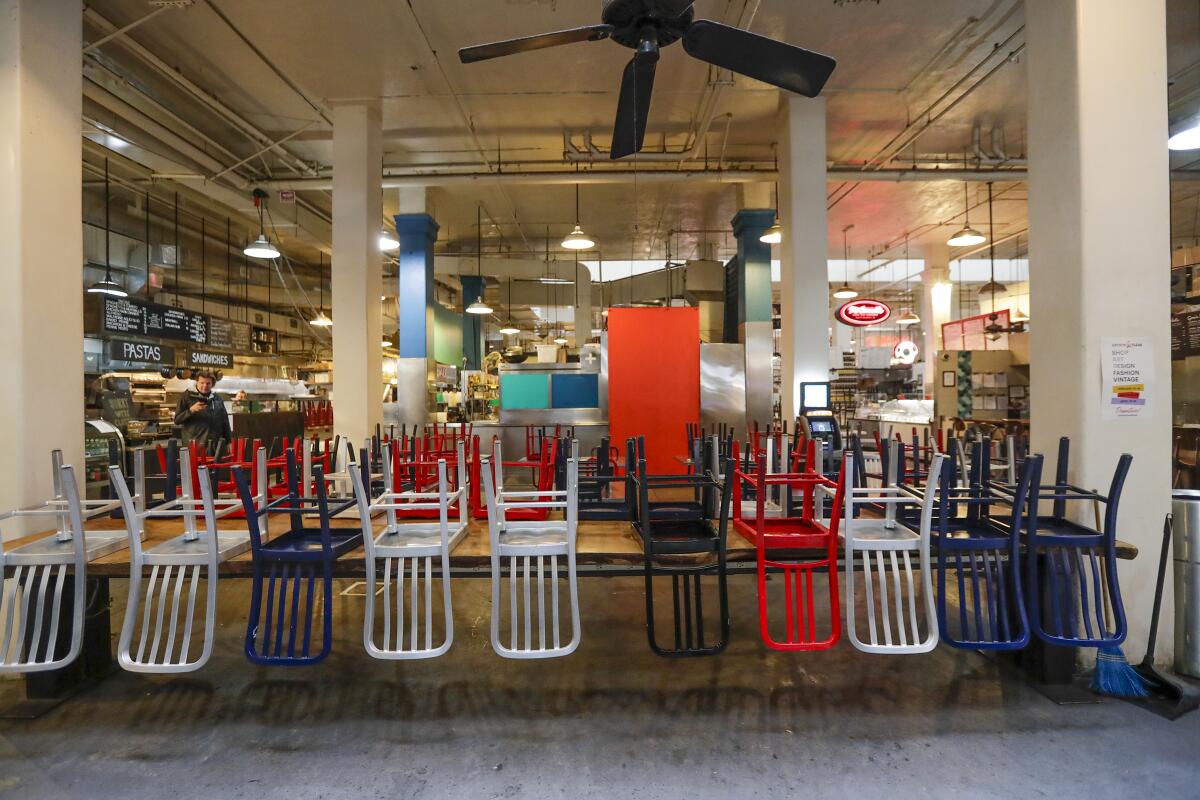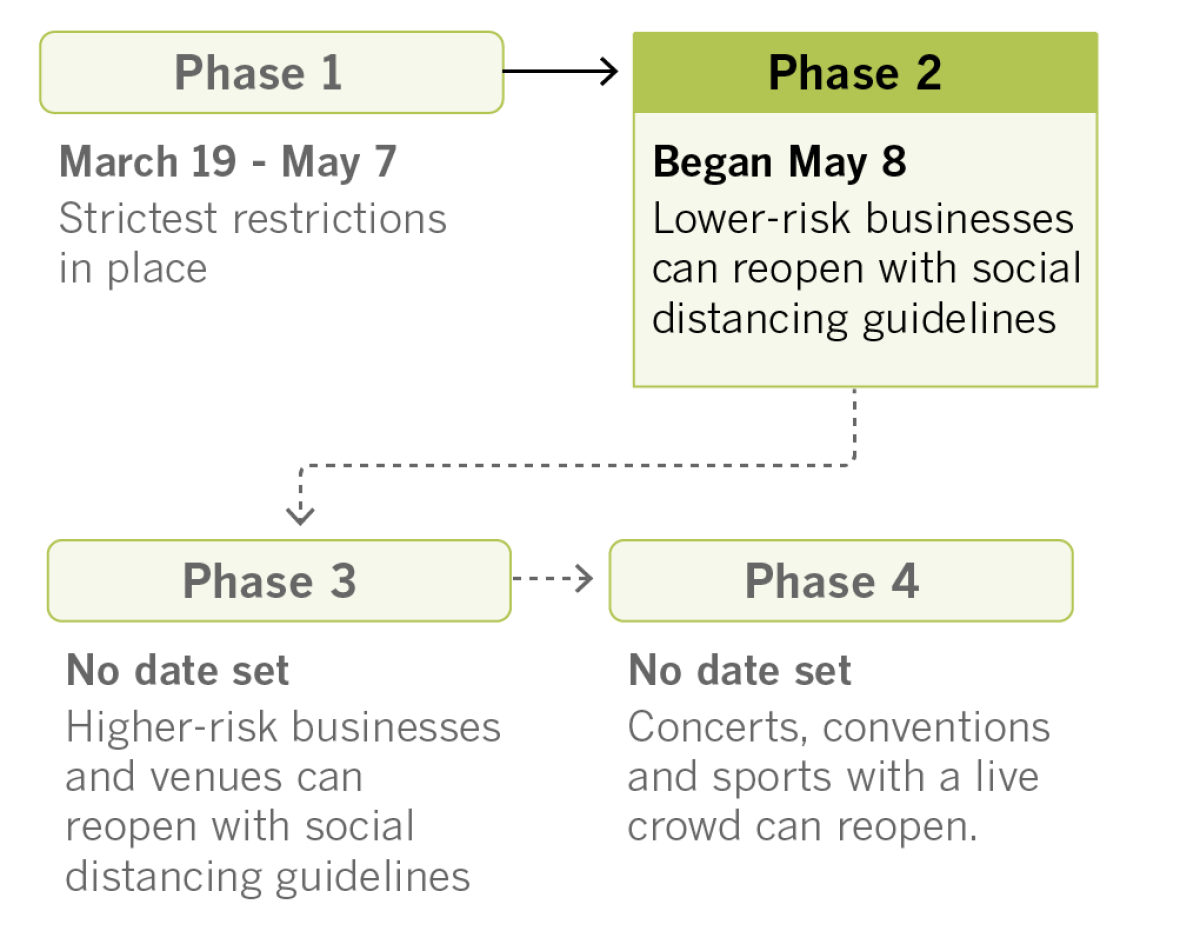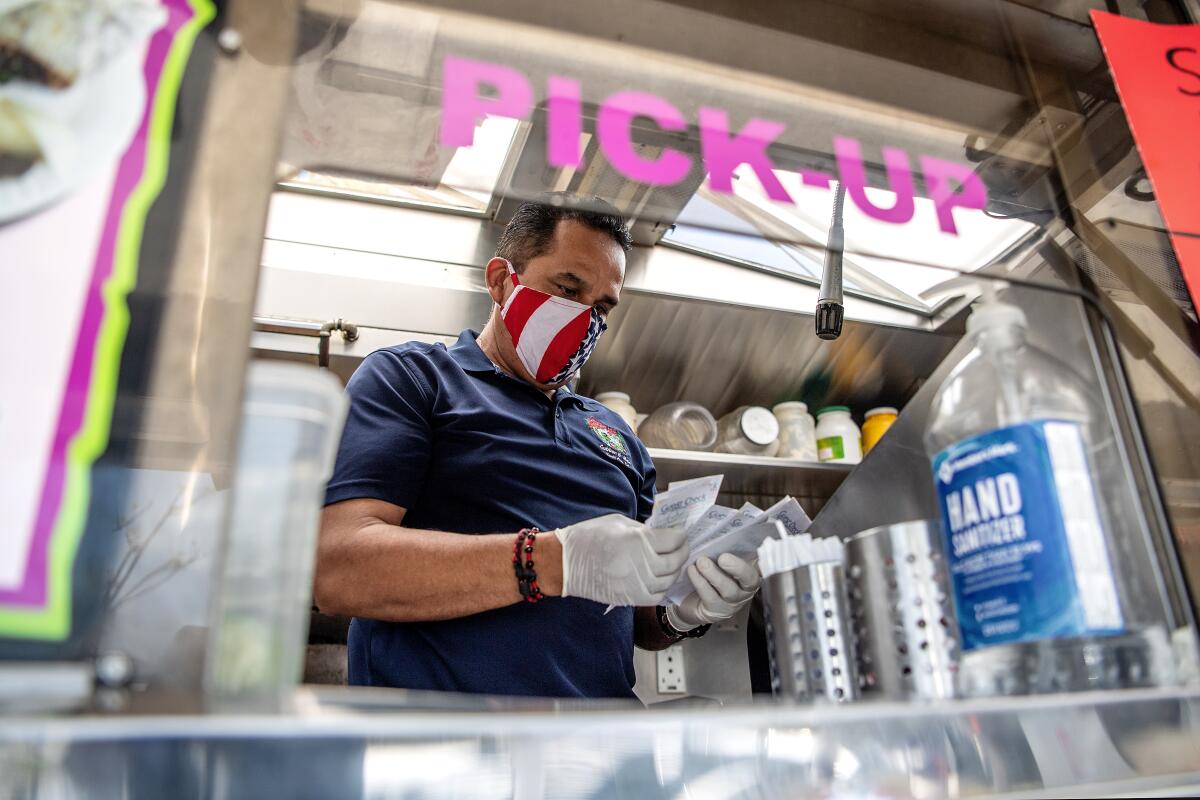Newsletter: What will restaurant dining rooms look like?

- Share via
Good morning, and welcome to the Essential California newsletter. It’s Wednesday, May 13, and I’m writing from Los Angeles.
Sign up for Essential California
The most important California stories and recommendations in your inbox every morning.
You may occasionally receive promotional content from the Los Angeles Times.
New guidelines issued Tuesday by Gov. Gavin Newsom offer the clearest picture yet of what a return to in-restaurant dining will look like for Californians.
The guidelines came as Newsom announced that two rural Northern California counties have met the state’s conditions for additional businesses to reopen. Butte and El Dorado counties are cleared to move into the latter part of Phase 2, meaning restaurants in those counties can reopen for dine-in service if they implement changes to guard against spreading the virus.
[Read the story: “Newsom sets new rules for reopening California restaurants, malls and offices amid coronavirus” in the Los Angeles Times]
Strip malls and outlet malls in counties certified as meeting state benchmarks for addressing the pandemic will also be allowed to open for pickup purchases from customers. All businesses will have to abide by state guidelines for physical distancing and cleaning regimens.
See below for a quick refresher on Gov. Newsom’s four phases for reopening.

)
Newsom said Tuesday that talks are underway with 27 other counties about whether they can expand reopenings. But a Times data analysis last week found that most big California counties are not close to meeting Newsom’s standards. For places like Los Angeles and the Bay Area, expanded reopenings and in-restaurant dining remain a long way off.
California’s 58 counties will move forward on very different timetables, but they will all have to adhere to the same guidelines for in-restaurant dining when their time comes. That guidance — which will require restaurants to drastically modify how things are done — was detailed in a 12-page PDF released by the governor’s office.
Whether you’re dining out in a matter of weeks in Butte County, or likely many months down the line in Los Angeles, here’s a look at what your first foray into a restaurant will probably look like based on those guidelines.
As you walk in, you’ll immediately notice some changes made to facilitate physical distancing. Think fewer tables and no seating within six feet of an employee work area. There might be floor markings or signs letting you know where to walk or stand, and there will probably be some kind of barrier or partition at the host stand or cash register. The bar area, if there is one, will be closed to customers.
Expect to sit down at an empty table. The guidelines dictate that restaurants discontinue presetting tables with napkins, cutlery and glassware. After you sit down, you’ll receive your utensils rolled in a napkin, handed to you by an employee who recently washed their hands. Anything that would otherwise stay on the table through multiple seatings, like napkin holders, salt and pepper shakers and condiment bottles, will also be gone.
You might peruse a digital menu on your phone or be handed a disposable menu, if you didn’t place your order ahead of time. Any nondisposable menus will have to be properly disinfected before and after each use.
The host, server, busser and food runner will all be wearing masks, as will be required of anyone who comes within six feet of customers. Anyone handling items that have been touched by customers will be wearing disposable gloves. Small talk and a lengthy recounting of the specials will probably be things of the past, as all restaurant workers will be asked to minimize time spent within six feet of customers.
When you look around the room, you won’t see anything that might be touched by multiple customers or that would require customers from different tables to congregate in the same area. No self-service water pitcher or coffee, no soda machine. No condiment or utensil caddies. And certainly not any self-service buffets or salad bars. Pool tables, vending machines, arcade games and the like will also be gone, or at least marked as off-limits.
You can also bid adieu to dessert carts and any kind of table-side preparation, be it made-to-order guacamole or Dal Rae’s legendary Caesar salad in Pico Rivera.
After the meal finishes, takeout containers will be an entirely do-it-yourself situation. If the restaurant you were at is a tablecloth kind of place, the table will be stripped after you leave by an employee wearing gloves. He or she will then transport the dirty linens out of the dining area in a sealed bag.
Of course, the diner’s experience will be only the tip of the iceberg. Every restaurant will be required to establish a worksite-specific COVID-19 prevention plan and train and communicate with employees around that plan. Each seating area will be thoroughly cleaned after use, and high-touch communal surfaces will be constantly disinfected. Extensive back-of-house modifications will be necessary to ensure physical distancing, including establishing directional hallways and passageways for foot traffic and potentially reconfiguring kitchens. Employees will probably have their temperatures taken upon starting a shift, as will any vendors, contractors or other workers entering the establishment.
[See also: “The Un-Heroic Reality of Being an ‘Essential’ Restaurant Worker” in Eater]
For as long as this pandemic rages on, those whose jobs put them in frequent contact with others will remain at the greatest risk of getting sick. One person’s return to dining-out normalcy will be another person’s return to a low-paid, high-risk workplace where an errant sneeze can spell disaster. So if and when you do dine out in the age of the coronavirus, tip generously. And remember that the special place in hell reserved for people who are rude to restaurant workers is 10 times more inferno-like for any actions undertaken during a pandemic.
And now, here’s what’s happening across California:
Los Angeles County’s stay-at-home orders will “with all certainty” be extended for the next three months, county Public Health Director Barbara Ferrer acknowledged during a Board of Supervisors meeting Tuesday. Ferrer later added that even if the orders remain in place through the summer, restrictions will be “gradually relaxed” under a five-step plan. Los Angeles Times
L.A. STORIES
Slammed economically by the coronavirus, Santa Monica offers a grim preview of the crisis to come. The coronavirus outbreak and the shutdown severed the city’s two main streams of revenue: hotel bed tax and sales tax. Santa Monica is now looking at a $226-million shortfall by June 2021. And while the affluent coastal town is better off than most of the 88 cities in Los Angeles County, it is facing drastic cuts and layoffs. Los Angeles Times
A drone’s-eye view of L.A.’s longest drive-through lines. Respect to the duo who could be seen playing Nintendo Switch on the dashboard while waiting in the hourlong line at Raising Cane’s in Downey. Eater LA
A coalition of literary arts organizations in L.A. appealed to the City Council for help. They sent an open letter, requesting that the council include the literary community in allocating emergency relief and federal stimulus funds, offer rent-alleviation for closed organizations and support a Writers Project-style narrative program commissioning writers to chronicle the pandemic’s effect on the city. Los Angeles Times
When “Valley Girl” shook up Hollywood: With no money or clout, what started as a cheap exploitation film rooted in Southern California’s Valley girl culture managed to, like, totally click with a generation — and produce an unconventional superstar. New York Times
Support our journalism
POLITICS AND GOVERNMENT
Two unprecedented proposals to help Californians weather the fiscal storm unleashed by the coronavirus crisis were unveiled Tuesday by Democrats in the state Senate — one to help struggling renters, the other to create a $25-billion economic recovery fund by issuing long-term vouchers to those willing to prepay their future state income taxes. Los Angeles Times
The 23-campus California State University system plans to all but cancel in-person classes in the fall and instead will offer instruction primarily online, Chancellor Timothy White announced. Los Angeles Times
Which California counties are reopening? Our data team has built a comprehensive page that tracks what has reopened in each of California’s 58 counties. Los Angeles Times
HEALTH AND THE ENVIRONMENT
From botox clinics to wellness spas, antibody tests are all the rage. Are they the real thing? “The tests don’t necessarily tell people whether they are immune to COVID-19 because scientists haven’t confirmed whether the antibodies even prevent reinfection. Most of the more than 200 tests on the market haven’t been cleared by regulators, and many could be faulty or of unknown origin, experts say.” Los Angeles Times
CALIFORNIA CULTURE
A taco truck owner in Santa Ana is trying to keep the city’s lonchera culture going. “Santa Ana is the only city in Orange County with a bona fide taco truck scene, one created by loncheros who successfully sued in 2006 for the legal right to park in one spot all day.” Los Angeles Times

Twitter employees can work from home — forever. Some jobs that require physical presence, such as maintaining servers, will still require employees to come in. BuzzFeed
The Fresno waffle rebellion: A local waffle restaurant has once again returned to takeout-only service after defying state and city COVID-19 orders by opening for dine-in service. Protests, fines and an incident that led to one man being handcuffed by Fresno police ensued. Fresno Bee
A family was trapped in an east Bakersfield cemetery on Mother’s Day after the gates were padlocked at 6 p.m. “It was quite strange. We’re not dead yet,” quipped local musician and truck driver Alex “AJ” Lopez, who visited Hillcrest Memorial Park on Sunday with his cousin from Whittier, her husband and their six children. Firefighters with bolt cutters eventually came to the rescue. Bakersfield Californian
NOT EVERYTHING IS TERRIBLE
Lin-Manuel Miranda’s Broadway smash “Hamilton” is coming to Disney+ a year early. The movie version of “Hamilton” combines three live performances featuring the original Broadway cast shot in June 2016, with Miranda in the title role. Los Angeles Times
These Bay Area grocery wholesalers are now open to the public, from a Sausalito-based sustainable fish purveyor to a national specialty foods company that’s served restaurants owned by folks like Thomas Keller, Michael Mina and Nancy Silverton. Eater SF
A poem to start your Wednesday: “Days” by Philip Larkin. Poetry Foundation
Free online games
Get our free daily crossword puzzle, sudoku, word search and arcade games in our new game center at latimes.com/games.
CALIFORNIA ALMANAC
Los Angeles: partly sunny, 73. San Diego: partly sunny, 69. San Francisco: cloudy, 62. San Jose: cloudy, 69. Fresno: sunny, 78. Sacramento: cloudy, 69. More weather is here.
AND FINALLY
Today’s California memory comes from Antonio Al Negrete:
As a young person living in Fresno County in the early 1960s you would have seen miles and miles of grape vines. My family lived in the small farming town of Tranquility, and on some weekends we would visit relatives in Sanger. The trip would take about 45 minutes, and most of the time on both sides of the road were grapevines. I would pretend that the grapevines were soldiers and I was reviewing my armed forces. Later as a teenager during the summer my brothers and I would pick grapes on these same vines. My father would drop us off to work and always said, ‘You can pick grapes or go to college.’ My brothers and I all went to college. It was a great life lesson.
If you have a memory or story about the Golden State, share it with us. (Please keep your story to 100 words.)
Please let us know what we can do to make this newsletter more useful to you. Send comments, complaints, ideas and unrelated book recommendations to Julia Wick. Follow her on Twitter @Sherlyholmes.
Sign up for Essential California
The most important California stories and recommendations in your inbox every morning.
You may occasionally receive promotional content from the Los Angeles Times.




